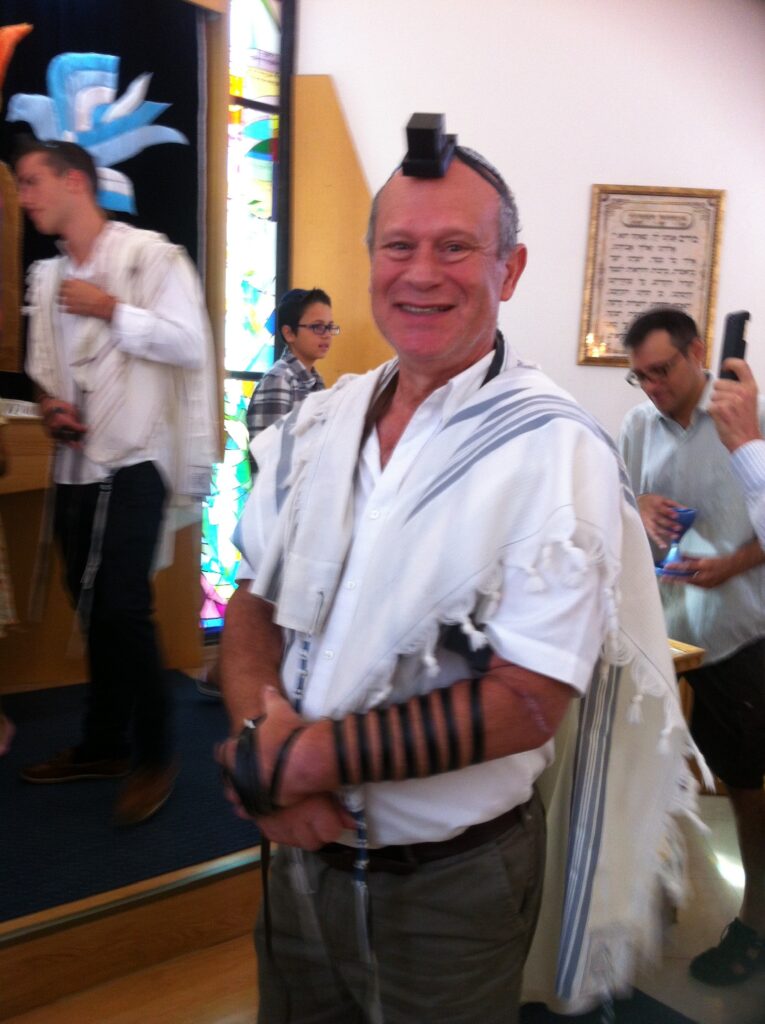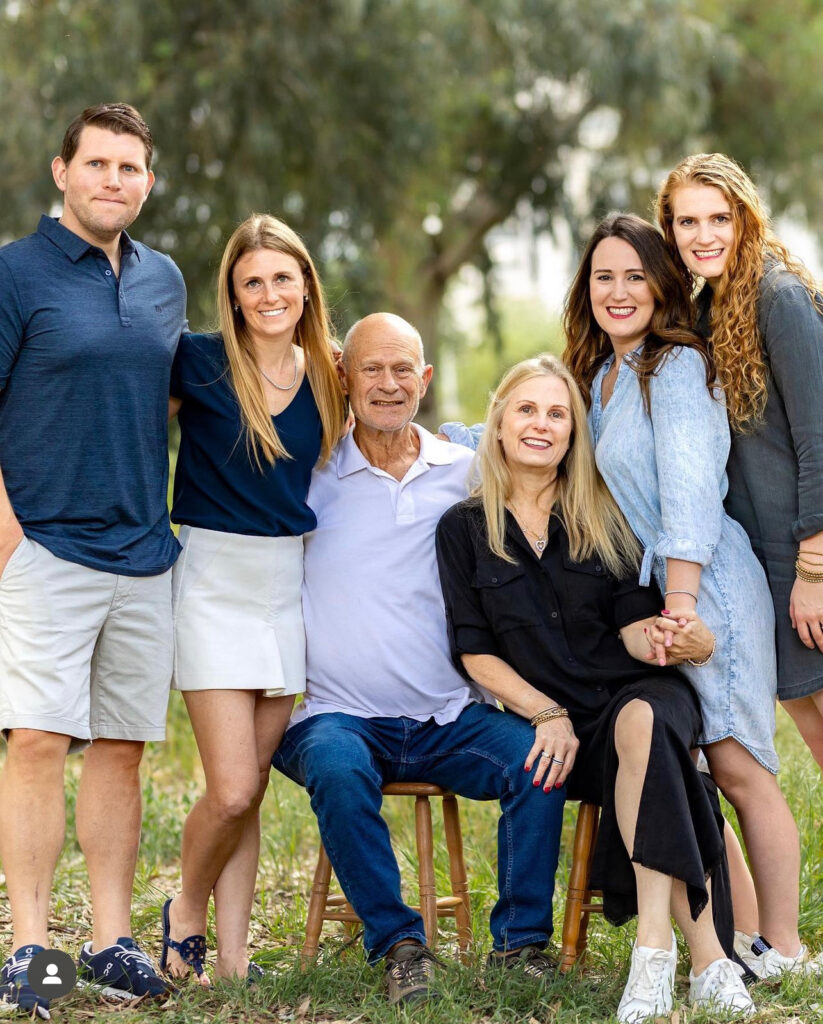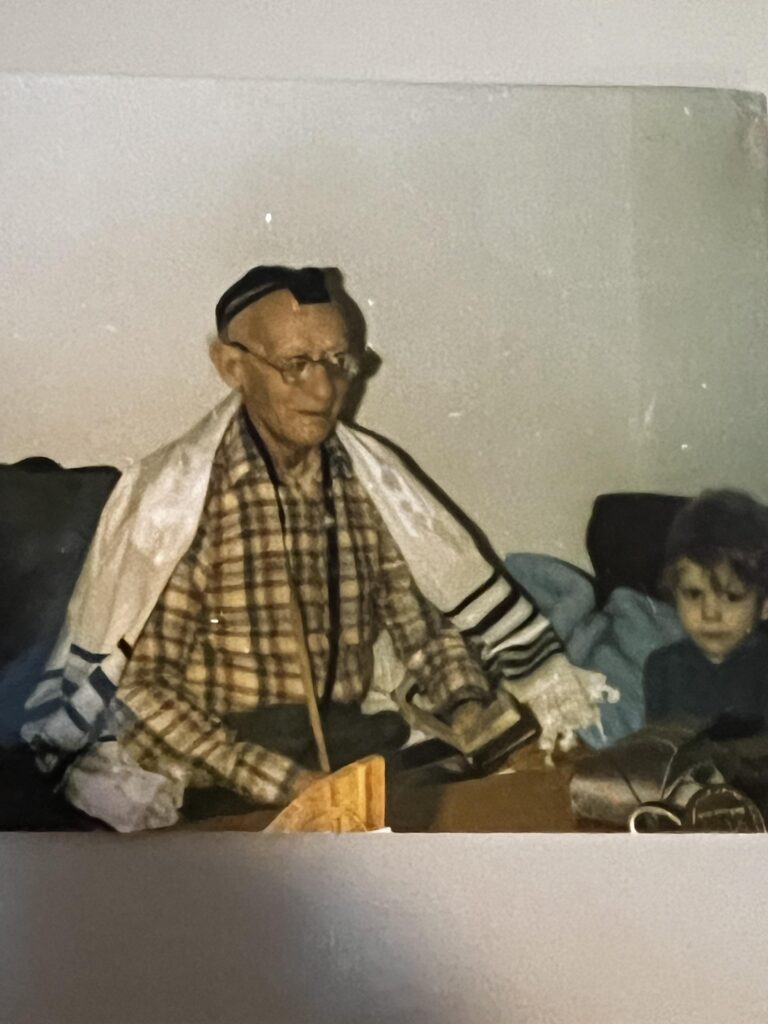Fred Barber (Shraga Fivish Ben Yosef) זצ״ל was born and raised in Seattle, Washington, where his parents settled after the Holocaust. Although his parents were religious, Fred’s religious journey only began after his parents passed away, and he fulfilled the mitzvah of saying Kaddish. At the end of his year of Kaddish, he continued attending shul and putting on tefillin. When asked by those around him “Why”, he said “it feels like this is part of his life’s purpose!” From that time on, Fred’s life revolved around his faith in Hashem and putting on tefillin became central to his daily routine. Every morning, Fred would wrap the leather straps of the tefillin around his arm and forehead, and daven to Hashem. This became far more than a tradition – it was Fred’s expression of his unwavering commitment and devotion to Judaism. His dedication to Hashem was not just confined to prayer; it permeated every aspect of his life, shaping his interactions with others, and guiding his decisions.
Despite life’s challenges and uncertainties, Fred’s faith remained unwavering. When Fred was diagnosed with pancreatic cancer and underwent surgery and intense treatment, he continued to make tefillin and davening a priority in his day – even if it took the only strength he had that day. In the last few weeks of his life, in and out of hospitals, Fred continued to put on tefillin. At the very end when he could no longer put on tefillin himself, he had his son help wrap his arms and forehead.
Fred was a pillar of strength and wisdom within his family and community. His testament to the power of faith reminds us all of the profound impact that a life dedicated to Hashem can have. His daily commitment to putting on tefillin serves as a source of inspiration to all who had the privilege of knowing him and to the many people this foundation hopefully serve.


Fred and Debbie Barber were blessed with four amazing children: Jacob, Rosalyn, Daniella and Rebekah. All of their children went to Jewish day schools and high schools and on to college or right away off to the business world. Each of them is successful in their own lives. You could not have found prouder parents.
At this time they have nine grandchildren and counting, (and 3 dogs in the mix).
The Story of Yosel Barber
Yosel Barber זצ״ל was one of eight children born into the Barber Family in Chrzanów, Poland. The Barbers owned a very successful factory and raised their family to be well educated and observant of Torah laws. His father was a beloved rabbi and merchant who studied with the Bobover Rebbe, Rabbi Ben Zion Halberstam ZT”L. Life was thriving and wonderful. Then along came the Nazi Party and Yosel’s enchanted life was forever destroyed.
The family, being closely tied to the Rebbe, knew there was trouble in Germany and that it was only a matter of time before it came to Poland. So they took much of their gold and silver and as many items of value as they dared and buried them. They hoped that one day they would be able to retrieve them.
In 1942, Yosel was 33 years old when the Nazis invaded his town. Many people he knew were murdered or injured, including some of his family. Jews were scattered and shipped off in cattle cars to unknown places or forced into ghettos.
Yosel and his younger brother, Yerachmiel, ended up in The Graditz Langbilua Labor Camp. Yosel spent part of his days hauling large stones on his back and then working in a textile facility, and Yerachmiel also worked in textiles.
Yosel and Yerachmiel were very devoted Jews as they had been educated under the tutelage of the Bobover Rebbe. The two brothers prayed every day and never missed putting on tefillin.
Only a miracle can explain how they were able to smuggle a pair of tefillin into the camp.
They carefully shared this sacred pair of tefillin with anyone who wanted to fulfill the mitzvah. Many of their fellow prisoners would take turns putting them on throughout the day. The tefillin was hidden under floor boards, in nooks in the building or holes in the ground, anywhere to keep them safe and away from the Nazis.. Yosel could recite many of the prayers by heart and he would always help those who hadn’t memorized the supplications.
After liberation, and never missing a day of putting on tefillin, they began a frantic search for their family and friends. Out of their enormous family, they could only locate one brother, David, and a few cousins. The wives and children, countless cousins and friends were all murdered.
Eventually, they were able to locate most of the valuables they buried before the war. They did not keep it to enrich themselves. The majority of the items were given to the fellow survivors they met to help them rebuild their lives. They had a deep and unwavering faith that G-d would provide for them again and they kept just a small portion for their immediate needs.
Most people would have given up and lost their faith at the realization of everything that was taken away from them and lost. Yosel and Yerachmiel’s belief in Hashem never stopped. They were both relocated to a Displaced Persons camp and married new wives. Yerachmiel and his new family eventually migrated to Israel. David and his family migrated to Argentina. Yosel and his new wife, Sala, traveled to America and landed in Seattle.
Sala was told she would never bear children. G-d graced them with a miracle baby and they named him, Fred. Fred grew up strong and attended The Talmud Torah and the family were active members of Bikur Cholim Machzikay Hadath Congregation. To this day the family of Yosel and Sala Barber still belong to this synagogue and not only did Fred attend the Seattle Hebrew Academy but Yosel and Sala’s grandchildren and great-grandchildren have as well.
Yosel imprinted on Fred his values and love for his community and especially the commandment to wear tefillin. I hope you as a reader can be inspired as well.

